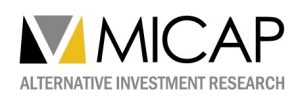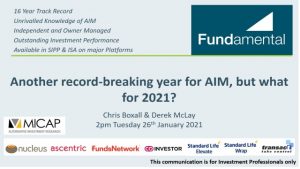Volatility brings Opportunity to AIM IHT planning investors
Equities in general continue to be weak and volatile as investors weighed mostly positive US earnings reports against the threat of rising interest rates.
Last week, the BoE’s monetary policy committee voted to increase the base interest rate by 25 basis points to 0.5%. This marked the first back-to-back rate hike since 2004 and came after data revealed UK inflation surged to a 30-year high in December amid rising energy costs and ongoing supply chain issues. The BoE also raised its inflation forecast to an April peak of 7.25%, which would be the highest since 1991.
What does this mean for AIM?
Global stock markets are led by the US, with the volatility experienced in larger growth companies felt to an even greater extent by smaller ones. Consequently, this has brought heightened volatility to AIM, London’s growth market, notwithstanding news and results, with the AIM index down around 11% for the year to date.
At the end of January 2022 there were 845 companies on AIM, with the total market value £134 billion.
AIM is a market with many growth focussed and successful businesses at the higher end but, given its smaller company start-up nature, it is also a market with companies yet to come into their own and even others which are yet to make a profit. In 2021 AIM welcomed 70 newcomers coming from a broad range of sectors with market capitalisations extending up to £1 billion.
AIM is a stock pickers market which is clear from the consistently strong performance made by AIM portfolio managers in the space.
Over the 5 years to end December 2021 the AIM index had risen 41% while the main UK stock market was only 7.5% higher. This suggests that UK investors had a better chance of outperforming by focusing on companies on AIM, as opposed to the UK main market, and also ignores the added potential benefit from Inheritance Tax savings. It will be interesting to see how the next 5 years work out.
At the end of 2021 30 AIM companies were valued at more than £1 billion each.
Over recent weeks, results and updates from AIM companies within our AIM Inheritance Tax planning universe have, with a few rare exceptions, been overwhelmingly positive, although share price declines would suggest otherwise.
You can find out more about the benefits of investing in AIM for IHT planning purposes in our free report available from the link here.
Our AIM IHT portfolio companies are well-established, highly profitable and cash generative and have excellent growth prospects – our latest fact sheets, available from our Document Library here, provide examples of some of these.
While inflationary fears and interest rate rises are upper most in some commentator’s minds, our AIM portfolio stocks are well-placed to maintain their growth, whatever the economic climate, having already proven themselves through challenging economic conditions over the last couple of decades.
At times like these there is nowhere to hide and our investing policy, followed consistently since our inception in 2004, is to ‘wait for the storm to blow over’.
If you want to hear more about AIM and its Inheritance Tax planning benefits, please watch our recent webinar here where we consider what 2022 might have in store for AIM and whether the compelling tax reliefs might be at risk.
You can access the webinar from our Educational Webinars page here or by going to the Fundamental Asset Management Brighttalk channel here. You will need to register on the Brighttalk platform, but registration is free.
Opportunity
As is so often the case during periods of irrational stock market selling, good companies are thrown out with the bad. So, for those with excess cash on the sidelines, the current AIM sell-off could present a good opportunity to buy into some excellent AIM companies at far more modest valuations.
It is worth remembering that from the middle of February to the middle of March 2020, during the early stages of the pandemic, AIM fell 36%, only to finish the year as a whole 20% up on where it had started, eclipsing the UK main stock market which remained 12% down over the course of the year – AIM companies offer plenty of volatility but also plenty of opportunity, as 2020 illustrated!
If you would like to talk to our portfolio managers about their curent thoughts on AIM, please contact Jonathan Bramall on 01923 713894 or email [email protected]
Our other popular educational webinars include:
All you need to know about investing in AIM for Inheritance Tax (Aug 2020)
And
The Truth about Risk in AIM (Sept 2020)
Fundamental Asset Management
www.fundamentalasset.com




